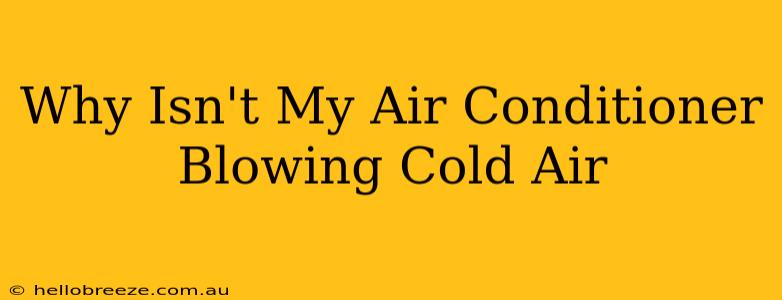Is your AC unit blowing warm air instead of the cool relief you crave? Don't sweat it (pun intended!), this is a common problem with easily identifiable solutions in many cases. This guide will walk you through troubleshooting the most frequent reasons why your air conditioner isn't blowing cold air, saving you money and frustration.
Common Reasons Your AC Isn't Blowing Cold Air
Several factors can contribute to your air conditioner's inability to produce cold air. Let's break down the most likely culprits:
1. Thermostat Issues:
- Incorrect Settings: Double-check your thermostat settings. Ensure it's set to "Cool," the temperature is appropriately low, and the system is switched "ON." A simple oversight can be the root cause!
- Faulty Thermostat: If the settings are correct but the AC remains unresponsive, the thermostat itself might be malfunctioning. Try replacing the batteries (if applicable) as a first step. If the problem persists, consider replacing the thermostat. A malfunctioning thermostat can prevent the AC unit from receiving the signal to start cooling.
2. Refrigerant Leaks:
- Low Refrigerant: Refrigerant is the crucial component that facilitates cooling. Leaks can significantly reduce the amount of refrigerant, rendering your AC ineffective. This requires professional attention as improper handling of refrigerants is dangerous. A visible leak may require immediate professional assessment, while a slow leak might manifest gradually with reduced cooling capacity.
- Identifying Leaks: Look carefully around the unit's coils and connections for any signs of oil stains or frost.
3. Dirty Air Filter:
- Restricted Airflow: A clogged air filter restricts airflow, causing your AC unit to work harder (and less effectively). This can lead to overheating and a reduction in cooling capacity. Changing your air filter regularly (at least once a month, or as recommended by the manufacturer) is crucial for maintaining optimal performance and efficiency.
4. Frozen Evaporator Coil:
- Ice Buildup: Insufficient airflow (often due to a dirty air filter or restricted vents) can cause the evaporator coil to freeze. The ice buildup inhibits the coil's ability to absorb heat, resulting in poor cooling. If you suspect a frozen coil, turn off your AC and allow it to thaw naturally. Once thawed, clean or replace the air filter and inspect for any airflow blockages.
5. Compressor Problems:
- Compressor Failure: The compressor is the heart of your AC unit, compressing the refrigerant. A malfunctioning compressor can lead to complete system failure or significantly reduced cooling capacity. This is usually a major repair and might necessitate professional service.
6. Electrical Issues:
- Power Supply: Ensure your AC unit is receiving adequate power. Check the breaker box to see if the circuit breaker has tripped. A tripped breaker often requires resetting. Also, examine the wiring to the unit for any damage.
- Capacitor Issues: The capacitor helps start the compressor. If it fails the compressor will not start or run intermittently, and your unit may experience weak cooling.
When to Call a Professional
While some issues can be addressed with simple DIY solutions, certain problems require the expertise of a qualified HVAC technician. Contact a professional if:
- You suspect a refrigerant leak.
- The compressor isn't working properly.
- You notice unusual noises coming from your AC unit.
- You're uncomfortable performing any repairs yourself.
Regular maintenance, including filter changes and professional inspections, can prevent many of these issues. Remember, a well-maintained air conditioner will provide years of reliable cooling. By understanding the potential causes of your AC not blowing cold air, you can take the necessary steps to restore cool comfort to your home.

